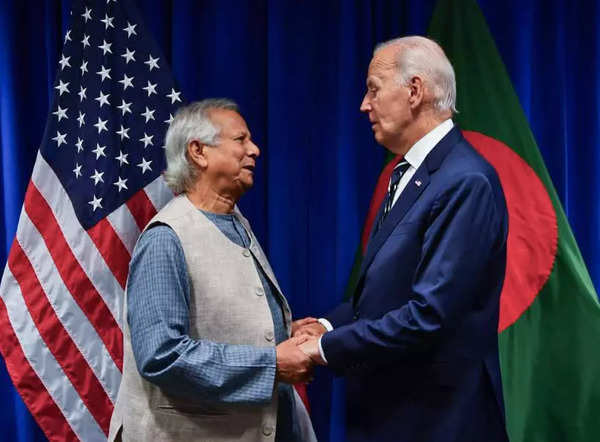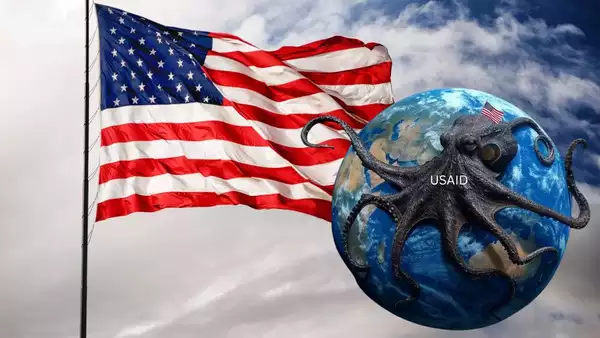Former US State Department official Mike Benz has alleged that the United States has actively interfered in the domestic politics of multiple nations, including India and Bangladesh, using a combination of media influence, social media censorship, and funding of opposition movements. According to Benz, US-backed agencies have used democracy promotion as a cover for influencing elections, destabilizing governments, and aligning foreign administrations with Washington’s strategic interests.
Claims of US Interference in India’s 2019 General Elections
Benz has alleged that elements within the US foreign policy establishment, including USAID, think tanks, and major technology companies, manipulated online discourse to influence India’s 2019 general elections against Prime Minister Narendra Modi and the BJP. He claims that these groups worked together to shape the election narrative by promoting the idea that Modi’s political success was largely the result of misinformation, creating the basis for widespread censorship.
According to Benz, US-backed entities strategically framed Modi’s supporters as spreading fake news online to justify intervention in India’s digital space. He claims that multiple organizations, including those linked to USAID, worked with major international media and digital forensics groups to create reports that described India as having a serious misinformation crisis. This, he argues, became a pretext for suppressing pro-Modi narratives on social media platforms.
Benz claims that the US State Department exerted influence on major tech companies such as Facebook, WhatsApp, YouTube, and Twitter to curb pro-Modi content. He asserts that WhatsApp, which is widely used for political messaging in India, was specifically targeted for restrictions. He points to WhatsApp’s decision in January 2019 to limit message forwarding in India as a deliberate move to curb BJP’s ability to reach voters, as the party’s supporters relied heavily on the platform for mobilization.
He also alleges that USAID and US-linked think tanks played an active role in these efforts by funding counter-misinformation programs that were actually designed to suppress nationalist movements like the BJP. Benz claims that organizations such as the Atlantic Council and the Global Engagement Center pushed for greater content moderation on social media under the justification of preventing misinformation, while in reality, their focus was on reducing the visibility of pro-Modi messaging.
Benz further claims that the anti-Modi campaign within the US government was carried out by factions within the State Department that operated independently of the Trump administration. Despite Trump’s strong relations with Modi, he suggests that entrenched bureaucratic elements within the State Department, including those overseeing cyber policies, were actively involved in coordinating censorship efforts with Big Tech. He asserts that officials within the Global Engagement Center and other US agencies advised social media companies on content moderation strategies aimed at limiting nationalist political movements worldwide, with Modi’s BJP frequently cited as a target.
While Benz does not directly confirm coordination between US-backed entities and Indian political groups, he claims that many counter-misinformation initiatives operating within India at the time were likely funded by USAID or other US foreign policy arms. He suggests that these organizations received financial and strategic backing to challenge BJP’s digital outreach efforts, further influencing the political discourse ahead of the elections.
According to Benz, these alleged actions reflect a broader US strategy of using digital censorship, media narratives, and funding of civil society groups to shape political outcomes in other countries. If his claims are accurate, they suggest that USAID and other US-backed organizations actively interfered in India’s democratic process by working to restrict Modi’s influence and boost alternative narratives that aligned with Washington’s foreign policy objectives.
Allegations of US Destabilization Efforts in Bangladesh

New York, Sep 25 (ANI): Bangladesh Chief Adviser Professor Muhammad Yunus meets with US President Joe Biden on the margin of the UN General Assembly meeting, in New York on Tuesday. President Joe Biden expressed the US government’s full support to the Bangladesh government. (ANI Photo)
Beyond India, Benz has claimed that the US also sought to influence Bangladesh’s political landscape, particularly in efforts to weaken Prime Minister Sheikh Hasina’s government. He suggests that this was due to Bangladesh’s growing economic and strategic partnership with China, which US policymakers viewed as a challenge to their regional influence.
According to leaked documents cited by Benz, US-funded organizations such as the National Endowment for Democracy and its affiliates allegedly worked on plans to destabilize the political situation in Bangladesh. These strategies included recruiting activists, mobilizing minority groups, and using cultural and ethnic tensions to create divisions within society.
One of the more unusual claims is that US taxpayer money was used to fund Bangladeshi rap music that was designed to promote anti-government sentiment. Benz suggests that these songs were strategically targeted at students and youth activists to encourage mass protests.
He argues that this approach aligns with previous US-backed movements in other countries, where soft power tactics, media influence, and funding of civil society groups have been used to create conditions favorable for political change.
Who is Mike Benz?
Benz is a former US State Department official who served as Deputy Assistant Secretary for International Communications and Information Technology from 2020 to 2021. In this role, he was responsible for formulating US policy on cyber issues and working closely with Big Tech companies. Before his government service, he worked as a White House speechwriter for President Donald Trump, advised on technology matters, and practiced business law for several years.
After leaving the government, Benz founded the Foundation for Freedom Online (FFO), a non-profit dedicated to exposing digital censorship and the manipulation of online narratives by governments and corporations. Through his work with FFO, he began investigating the role of USAID, the National Endowment for Democracy (NED), and other US-backed agencies in influencing political systems abroad. His research led him to uncover patterns of media manipulation, social media censorship, and funding of opposition groups under the guise of democracy promotion. His findings, based on leaked documents and insider knowledge, have positioned him as a whistleblower on how USAID and similar entities allegedly engage in covert influence operations worldwide.
Broader US Influence in Other Nations

Benz places these actions within a broader pattern of US influence operations worldwide. He claims that similar tactics have been observed in other countries where Washington sought to install or maintain a government that aligned with its foreign policy goals. He points to events such as US involvement in Ukraine’s political upheaval, support for opposition leaders in Venezuela, and interventions in the Middle East and North Africa.
According to Benz, these efforts typically involve a mix of media narratives, digital censorship, financial support for opposition groups, and diplomatic pressure. He suggests that these actions are often justified under the pretext of democracy promotion, but in reality, serve strategic interests such as countering China’s influence, securing military footholds, or ensuring economic access.
Claims of Independent Factions Operating Within US Foreign Policy
One of Benz’s key claims is that these operations are often carried out by factions within the US foreign policy establishment that operate independently of the elected government. He alleges that Trump had little control over the rank-and-file officials in the State Department, many of whom pursued policies that contradicted his administration’s stance.
He suggests that these factions use a network of think tanks, media partnerships, and social media platforms to execute their strategies, sometimes without direct oversight from political leadership. This, according to Benz, explains why efforts against Modi and Hasina were pursued even when Trump had good relations with both leaders.
What Now?
If Benz’s claims are accurate, they point to a pattern of US foreign policy that prioritizes strategic interests over the sovereignty of other nations. The allegations suggest that under the banner of democracy promotion and misinformation control, the US may be influencing elections, destabilizing governments, and pushing for regime change when leadership does not align with Washington’s goals. As geopolitical tensions continue to rise, particularly between the US and China, these alleged influence operations may become a more critical factor in shaping political landscapes in South Asia and beyond. The extent to which these claims will be further substantiated remains to be seen, but they add to ongoing debates about the role of foreign intervention in domestic politics worldwide
